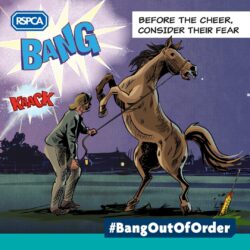 This year, the charity has launched their very own campaign #BangOutOfOrder, helping to raise the awareness of the impact of fireworks on animals. As part of the campaign, the RSPCA is encouraging local authorities to take more action on fireworks.
If you're one of the 85% of people who think public firework displays should be licensed, take a look at the RSPCA's #BangOutOfOrder webpage here.
Find out how to keep your horse safe this weekend and carry on reading our blog below:
The sudden noise and lights from fireworks can cause huge distress for horses. Being flight animals, horses may panic and run blindly, injuring themselves – in some cases fatally - in the process. According to BHS figures, since 2010, 20 horses have been fatally injured, 10 have been seriously injured and 88 moderately injured in fireworks incidents.
What to do if your horse lives near an organised fireworks display
Many people suggest keeping your horse stabled over-night when there are fireworks nearby so they don’t take fright and run blind in the field – or worse. This can work well if the horse/s are used to being stabled. However, if horses are not used to coming in to a stable then this can be stressful in itself for them, add in the firework bangs that they will undoubtedly hear and horses can become very agitated. If you decide to bring your horse in ahead of fireworks, it is likely to be best to remain around the yard whilst the fireworks are on and to definitely check the horse/s once the fireworks have finished.
For particularly highly strung or sensitive horses, some people will turn a radio on in the yard and put cotton wool ear plugs in their horses’ ears to minimise the effect of the loud bangs.
Before putting your horse out the next day, it is advisable to thoroughly check the field for firework debris. Even if the local firework display is not particularly near, firework packaging can travel quite a distance when it heads skyward on a rocket.
What about smaller, private fire work displays?
The above may work well for when you know that an organised firework display is taking place locally, but for those bangs and flashes that may be taking place relatively nearby for the few weeks either side of the 5th November, keeping your horse in overnight for several weeks may not be an option.
In this situation, keeping to the horse’s normal routine can be best and should reassure him as he knows that life is as normal. Be sure to communicate with people living locally to where your horses are kept and ask them to keep you informed if anyone is planning to let off fireworks. Also, make sure to communicate with people from other yards locally and ask them to keep your yard updated with any firework related news. Mentioning to neighbours that horses are frightened by fireworks can be very useful as it will not always occur to people that they could be causing animals distress by letting off fireworks.
Be extra vigilant when checking the field each day around bonfire night. Make sure all fences are secure and keep a lookout for any firework debris that may have landed in the field.
If you are in any doubt, always go back to check your horse in the evening, this can be as reassuring for you as for him to make sure all is well. Maybe even put together a yard rota for checking the horses late at night during late October and early November.
About SEIB
SEIB have been arranging horse insurance for over 50 years. This experience allows us to tailor policies to suit your circumstances and ensure that you and your horses are covered should the worst happen.
This year, the charity has launched their very own campaign #BangOutOfOrder, helping to raise the awareness of the impact of fireworks on animals. As part of the campaign, the RSPCA is encouraging local authorities to take more action on fireworks.
If you're one of the 85% of people who think public firework displays should be licensed, take a look at the RSPCA's #BangOutOfOrder webpage here.
Find out how to keep your horse safe this weekend and carry on reading our blog below:
The sudden noise and lights from fireworks can cause huge distress for horses. Being flight animals, horses may panic and run blindly, injuring themselves – in some cases fatally - in the process. According to BHS figures, since 2010, 20 horses have been fatally injured, 10 have been seriously injured and 88 moderately injured in fireworks incidents.
What to do if your horse lives near an organised fireworks display
Many people suggest keeping your horse stabled over-night when there are fireworks nearby so they don’t take fright and run blind in the field – or worse. This can work well if the horse/s are used to being stabled. However, if horses are not used to coming in to a stable then this can be stressful in itself for them, add in the firework bangs that they will undoubtedly hear and horses can become very agitated. If you decide to bring your horse in ahead of fireworks, it is likely to be best to remain around the yard whilst the fireworks are on and to definitely check the horse/s once the fireworks have finished.
For particularly highly strung or sensitive horses, some people will turn a radio on in the yard and put cotton wool ear plugs in their horses’ ears to minimise the effect of the loud bangs.
Before putting your horse out the next day, it is advisable to thoroughly check the field for firework debris. Even if the local firework display is not particularly near, firework packaging can travel quite a distance when it heads skyward on a rocket.
What about smaller, private fire work displays?
The above may work well for when you know that an organised firework display is taking place locally, but for those bangs and flashes that may be taking place relatively nearby for the few weeks either side of the 5th November, keeping your horse in overnight for several weeks may not be an option.
In this situation, keeping to the horse’s normal routine can be best and should reassure him as he knows that life is as normal. Be sure to communicate with people living locally to where your horses are kept and ask them to keep you informed if anyone is planning to let off fireworks. Also, make sure to communicate with people from other yards locally and ask them to keep your yard updated with any firework related news. Mentioning to neighbours that horses are frightened by fireworks can be very useful as it will not always occur to people that they could be causing animals distress by letting off fireworks.
Be extra vigilant when checking the field each day around bonfire night. Make sure all fences are secure and keep a lookout for any firework debris that may have landed in the field.
If you are in any doubt, always go back to check your horse in the evening, this can be as reassuring for you as for him to make sure all is well. Maybe even put together a yard rota for checking the horses late at night during late October and early November.
About SEIB
SEIB have been arranging horse insurance for over 50 years. This experience allows us to tailor policies to suit your circumstances and ensure that you and your horses are covered should the worst happen. Important Notice
Thank you for visiting the SEIB website. Our staff are working remotely but are still able to deal with your enquiries in a timely manner.
Please call 01708 850 000 or email info@seib.co.uk
We appreciate these are difficult times, if you’re an existing customer experiencing financial difficulty as a result of Covid-19, please contact us to discuss your payment options.



